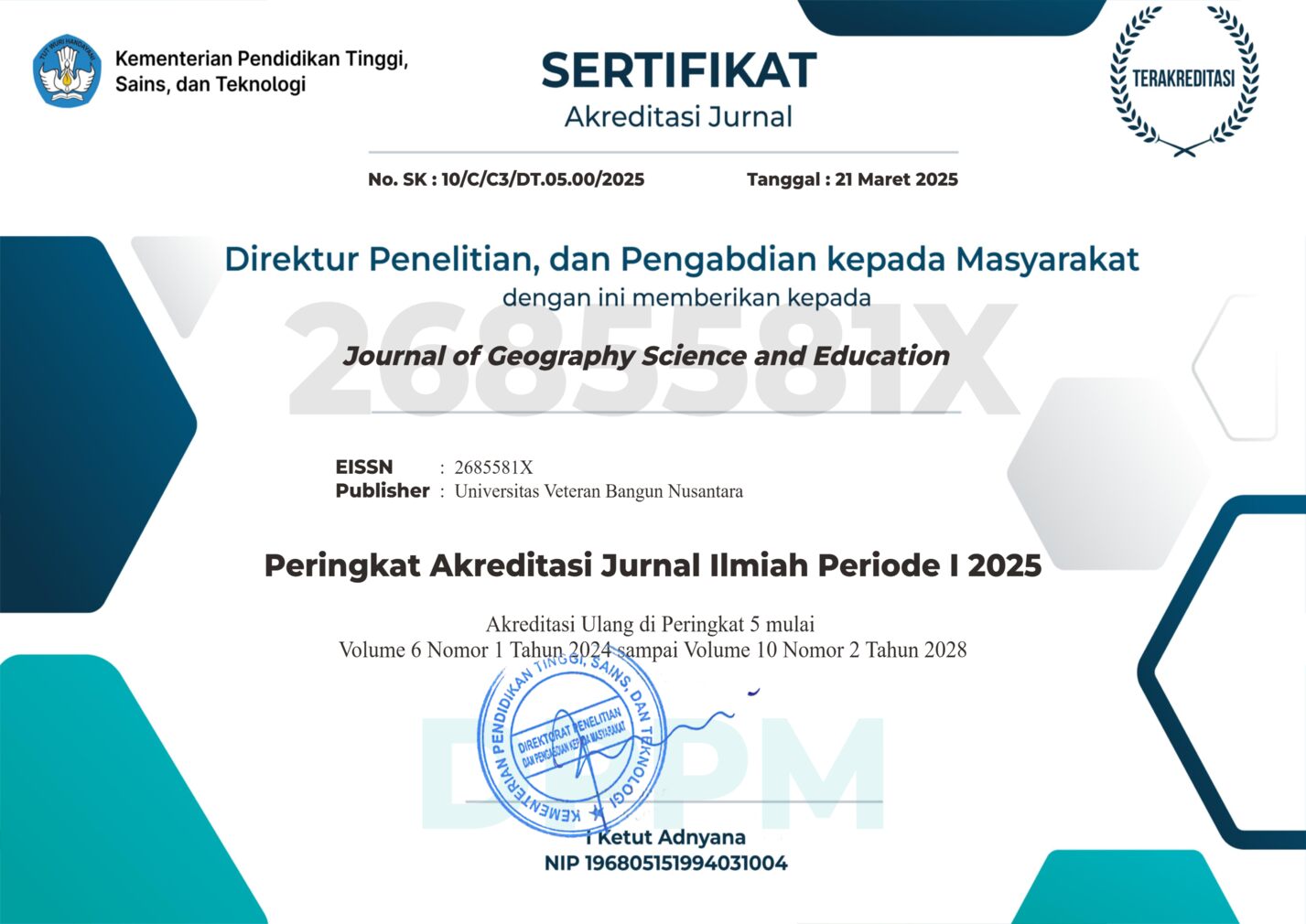THE EFFECTIVENESS OF ONLINE LEARNING TO STUDENT LEARNING ACTITIVITIES OF FKIP UNIVERSITAS VETERAN BANGUN NUSANTARA SUKOHARJO (CASE STUDY: COVIF-19 EMERGENCY DISASTER 21 MARCH-31 MAY 2020)
DOI:
https://doi.org/10.32585/jgse.v2i2.1358Keywords:
Effectiveness Online learning Learning activitiesAbstract
This study aimed to discover: (1) The effectiveness of online learning to student learning activities of the Faculty of Teacher Training and Education in Universitas Veteran Bangun Nusantara Sukoharjo during the COVID-19 disaster response period of 2020. (2) The readiness form of FKIP & The Univet Institution in online learning utilization during the COVID-19 disaster response period of 2020. The method in the study was qualitative descriptive and the sampling technique used was Proportionate Stratified Random Sampling. The data collection technique used was using observations, questionnaires, and documentation. The data analysis technique used was qualitative data analysis. Based on the study, it can be concluded that: (1) The online learning utilization to student learning activities in the Faculty of Teacher Training and Education has been effective, but it still needs improvement or refinement in several aspects. (2) The Faculty of Teacher Training and Education's lecturers using online learning during the COVID-19 disaster response period were mostly ready, but need gradual training to be professional lecturers. (3) The presence of multimedia components and sufficient e-learning procurement by the institution of Universitas Veteran Bangun Nusantara Sukoharjo for online learning during the COVID-19 disaster response period.Downloads
References
Bednarz, Sarah. 2000. “Geography Education Research in the Journal of Geography 1988-1997.” International Research in Geographical and Environmental Education 9 (2): 128–40. doi.org/10.1080/10382040008667641.
Liu, Suxia, and Xuan Zhu. 2008. “Designing a Structured and Interactive Learning Environment Based on GIS for Secondary Geography Education.” Journal of Geography 107 (1): 12–19. doi.org/10.1080/00221340801944425.
Morgan, John. 2002. “‘Teaching Geography for a Better World’? The Postmodern Challenge and Geography Education.” International Research in Geographical and Environmental Education 11 (1): 15–29. doi.org/10.1080/10382040208667460.
Patterson, Todd C. 2007. “Google Earth as a (Not Just) Geography Education Tool.” Journal of Geography 106 (4): 145–52.
Trigwell, Keith. 2006. “Phenomenography: An Approach to Research into Geography Education.” Journal of Geography in Higher Education 30 (2): 367–72. doi.org/10.1080/03098260600717489.
Anggraini, A. 2018. Keefektifan Pembelajaran Elektronik (E-Learning) Sebagai Pengganti Perkuliahan Konvensional Untuk Meningkatkan Kemampuan Analitis Mahasiswa. Jurnal Sosial Humaniora, 9(2), 95-105.
Arikunto, Suharsimi. 2013. Prosedur Penelitian : Suatu Pendekatan Praktik. Jakarta: Rineka Cipta.
Margianto, Heru. (2020, 28 Maret). “Corona Dan Revolusi Ruang Virtual”. Kompas. https;//www.kompas.com/tren/read/2020/03/29/113704465/corona-dan-revolusi-ruang-virtual?page=3.
Moleong, Lexy J. 2017. Metode Penelitian Kualitatif. Bandung: PT Remaja Rosda karya.
Sudjana. 2017. Penilaian Hasil Proses Belajar Mengajar. Bandung : Remaja Rosdakaya.
Sugiyono. 2017. Metode Penelitian Kuantitatif Kualitatif Dan R&D. Bandung: Alfabeta.
Surat Edaran Mendikbud No. 4 Tahun 2020 tentang pelaksaanaan kebijakan Pendidikan dalam masa darurat penyebaran corona virus disease (COVID-19).
Surat Edaran REKTOR Universitas Veteran Bangun Nusantara Sukoharjo Tahun 2020 Nomor: 163/A/B.1/Univet.Btr/III/2020 tentang kesiagaan dan tindakan pencegahan penyebaran Covid-19.
Yamin, M. 2013. Strategi dan Metode dalam Model Pembelajaran. Jakarta: Referensi (GP Press Group).
Yunita, Niken Widya. (2020, 28 Maret). “Memahami lagi arti lockdown COVID-19 dan Pandemi”. detikNews. https://news.detik.com/berita/d-4956587/memahami-lagi-arti-lockdown-covid-19-dan-pandemi
Downloads
Published
How to Cite
Issue
Section
License
Authors who publish with the Journal of Geography Science and Education agree to the following terms:
- Authors retain copyright and grant the journal the right of first publication with the work simultaneously licensed under a Creative Commons Attribution License (CC BY-SA 4.0) that allows others to share the work with an acknowledgment of the work's authorship and initial publication in this journal.
- Authors are able to enter into separate, additional contractual arrangements for the non-exclusive distribution of the journal's published version of the work (e.g., post it to an institutional repository or publish it in a book), with an acknowledgment of its initial publication in this journal.
- Authors are permitted and encouraged to post their work online (e.g., in institutional repositories or on their website) prior to and during the submission process, as it can lead to productive exchanges, as well as earlier and greater citation of published work.










